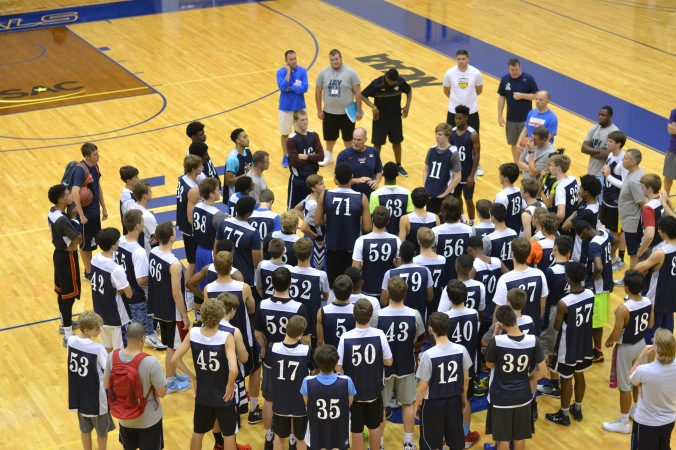
For anyone who works with youth sports, particularly high school aged youth sports, you’ve probably heard a player or parent ask: “How can I get more exposure to college coaches?” I believe that we should refocus this question to “Where can I get the best instruction?”
I understand and appreciate the desire to “be seen” by college coaches in your sport. I had the opportunity to play college basketball and it was one of the most impactful and important experiences of my life. I have seen, however, too many families who are only focused on the exposure they are getting once they have made it to high school and have started to dream about the possibility of playing their sport in college. Instead of enjoying the game and improving their skills, they focus on who is watching and how their individual play is being evaluated. Why is this a problem? In order to understand it, it is important to look at the roots of the words “instruction” and “exposure.”
The word instruct is simply defined as “to teach someone a subject or skill.” When you are receiving instruction in your sport a coach or other teacher is spending time teaching you skills important to the game. The environments that this teaching takes place usually are safe places where it is ok to make mistakes, it is ok to stop and discuss things with the teacher, and it is ok to ask questions of others. By nature, a teaching environment does not contain the pressure of a performance environment, thus allowing the student to learn at his or her own pace and focus on improving weaknesses. All too often, when athletes get to the high school level they believe that they don’t really have anything else to learn; they usually know the basics and their physical abilities have made them better than most of their peers. This false sense of security leads players to de-emphasize or completely ignore their need for skill instruction from qualified coaches and teachers of their game. The reality is that as your game advances, it becomes even MORE important to get quality coaching and instruction to get better. One of the coaches that I’ve had the pleasure of working with at the Jay Bilas Skills Camp is Alan Stein and he shared his experience in working with Steph Curry, arguably the most skilled player in the NBA today. Continuing to learn and receive instruction will ensure that you continue to improve your game.
On the contrary, the word expose is defined as “to reveal something hidden.” If you think about this, how often do you really WANT exposure? Players and parents alike think that anything that is providing them exposure to college coaches and scouts is a good thing; the reality is that every one of those “exposure camps” or “exposure events” is designed to reveal something hidden. Every time you play in front of a college coach, they are looking for you to expose your weaknesses. If you can’t guard one on one, that will be exposed. If you aren’t a good teammate or aren’t coachable, that will be exposed. If you are one dimensional in your offensive skills, that will be exposed. The whole purpose of exposure events and the evaluation periods for college coaches is for them to determine which players they are going to spend time pursuing in a more personal manner. The easiest way to shorten that list is for your skills to be exposed in relation to others of your same age group. Once you step between the lines in games at these exposure events, your game is what it is and it will be exposed.
I get it, players and parents still want a chance to play their sport at the college level and our current system relies on exposure events to give college coaches a chance to see players who may be able to play at their level. I’m not suggesting that there is no value to exposure events and that everyone should stop attending them. What I am suggesting is that skill instruction SHOULD NOT BE OVERLOOKED for high school athletes. It isn’t good enough to just get your teaching during your high school season and then go play on a club team or travel team to get exposure. Players who are serious about continuing to improve so that they can COMPETE at the next level, should seek out opportunities for instruction in the off season as well. This might mean choosing a club team or AAU team that is focused on teaching and improving your game. This might mean going to camps where the focus is on improving your skills, not showing off for college coaches. This might mean skipping a few ‘exposure events’ so that you can get some one on one instruction from a qualified teacher of your game. And it definitely means a lot more individual work on your own and small group work with your friends to improve your skills. If you focus more on INSTRUCTION, I can almost guarantee that there will be less to EXPOSE when you’re in front of those college coaches.
